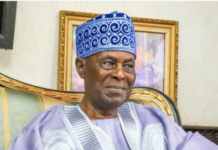
- BRIEF ON NATIONAL SECURITY ISSUES BY THE NATIONAL SECURITY ADVISER
- The NSA briefed the Council on the Security situation in the country with particular reference to:
- Boko Haram insurgency in the North-East
- Cattle rustling
- Ethnic militias/security outfits
- Kidnapping
- Armed robbery
- Militancy in Niger Delta
- Proliferation of small arms across the country
- The NSA fingered unemployment as the major security concern.
- In their responses, Council members highlighted the potential role and significance of the Federal Government’s Social Investment Programmes in averting some of the security concerns and encouraged an active implementation going forward.
- Council resolved to hold an extra-ordinary session to fully discuss pertinent national security matters especially as it has to do with the economy.
- NEC WELCOMED PRESIDENT
- The Council welcomed the President, President Muhammadu Buhari, who had a brief interaction with Council members today. The Governors thanked him for his several supportive policies to the States. The President had met briefly with the Governors during a short break in Council deliberation.
- PRESENTATION ON NIGERIA VOLUNTARY ASSET & INCOME DECLARATION SCHEME BY HONOURABLE MINISTER OF FINANCE
- The under-payment of tax via the use of Tax Havens and other evasion strategies has not been helpful to Nigeria. This involves multi-national companies and high net worth individuals.
- Nigeria has one of the the lowest non-oil tax to GDP ratio at 6%
- The proposed Nigeria Voluntary Asset and Income Declaration Scheme (VAIDS) will capitalise on the considerable international goodwill built by President Buhari in his mission to rebuild Nigeria.
- It will also capitalise on the current global movement against tax evasion and illicit financial flows.
- It will offer a window for those who have not complied with extant tax regulations to remedy their position by the provision of limited amnesty to enable voluntary declaration and payment of liabilities.
- The target of the VAIDS scheme is the increase of the country’s tax to GDP ratio to 15% from just 6% by 2020.
- VAIDS scheme will simultaneously generate revenue and encourage investment and economic activity – as only 214 individuals in the entire country pay N20 million or more in tax annually
- VAIDS scheme will embrace all Federal and States’ taxes such as Companies Income Tax, Personal Income Tax, Petroleum Profits Tax, Capital Gains Tax, Stamp Duties, Tertiary Education Tax, & Technology Tax.
- The scheme is targeted to start from May 1, 2017 and incentives will be put in place to encourage early participation
- Revenue expected from the scheme conservatively estimated at US$1 billion.
- Based on initial estimates, it is anticipated that at least 50% of the funds recovered will belong to States who are the ultimate collectors of personal income taxes.
*Council approved the scheme in principle, while additional inputs are to be considered.
C2 REPORT ON EXCESS CRUDE PROCEEDS
- The Honourable Minister of Finance also reported to Council that the balance in the Excess Crude Account (ECA) as at 15th March, 2017 stood at US$2,459,864,724.59, recording a marginal increase of US$2,458,382,882.03
- Finance Minister added that the ECA balance does not reflect as yet the decision of Council last month to deduct $250 million for injection into the Sovereign Wealth Fund
STABILIZATION FUND ACCOUNT
- The Stabilization Fund Account (SFA) is an account equivalent to 0.5% of the Federation Account allocated and paid into a fund to be designated (Stabilization Account) from where any State of the Federation that suffers absolute decline in its revenue arising from factors outside its control, shall tap in, to augment the allocation to that State.
- Based on the above, the Hon. Minister of Finance informed Council that the Revenue Mobilization Allocation and Fiscal Commission (RMAFC) recently approved for disbursement (N39,613,282,870.69) to a number of States.
- The Honourable Minister further informed Council that the balance in the SF now stands at N25,793,400,290.00
- PRESENTATION ON POLICY DIRECTION ON AFFORESTATION, REFORESTATION AND SUSTAINABLE FOREST MANAGEMENT BY HONOURABLE MINISTER OF STATE, ENVIRONMENT
Background Information on the Presentation
- Various stakeholders have broadly acknowledged the alarming rate of deforestation and its causes across the Nigeria landscape
- Major drivers of deforestation remain unsustainable agricultural practices, over exploitation of forest (for external and domestic trade), infrastructural development among others.
- Deforestation has progressed at about 3.5% of the total forest area level in the last decade – which translates to about 350,000 hectares of forest loss and requiring at least 420 million tree seedlings per annum to pant over-run deforestation.
EFFORT MADE SO FAR
- July 2016 National Council on Environment (NCE) held in Lafia, Nasarawa State resolved to encourage States to promote forestry development and aforestation programmes and to also promote the use of alternative sources of energy
- Temporary lifting of the suspension on wood export and issuance of convention of International Trade in Endangered Species of Wood Faora & Flora permit.
- Ministry of Environment set about strengthening processes that would enable legitimate business to obtain the required permit.
Recommendations among others
- Need to accelerate and review the extant National Forest Policy as well as ensure its backing through the enactment of relevant Forest Laws.
- Massive Afforestation/Reforestation of degraded forest and landscape outside Forests.
- Establishment of take-off of the National Forestry Trust Fund through contributions by Wood Products Exporters according to products classification (tally processed, semi processed, charcoal) etc.
- Establishment of National Forest Model Estate in all the States and FCT.
- Improvement in forest governance and establishment of National Taskforce to effectively protect the forest Estate/Reserve.
- Effective monitoring, evaluation, documentation of trade in wood and wood product.






